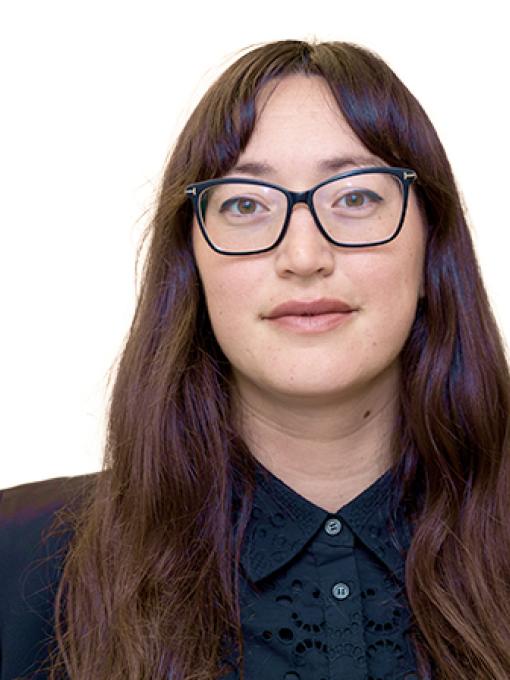Since the Israel-Palestine war began following the deadly attack by Hamas on Oct. 7, we have witnessed a dramatic rise in Islamophobic and antisemitic rhetoric and violence throughout the United States.
Hadiya and Odeliya are colleagues and friends at the Friends Committee on National Legislation. Hadiya is a Muslim American living in Chicago, IL. Odeliya is an Israeli Jew residing in Washington, D.C.
This rising tide of hate is something that they can’t ignore—as individuals or as advocates for peace.
Recently, they sat down for a conversation about how they are each experiencing this moment. The following interview has been edited for length and clarity.
Odeliya: Hadiya, how are you feeling right now?
Hadiya: I’m holding a lot of grief and pain for the violent ripples that occupation and perpetual displacement cause across the world.
Those ripples travel far—from the murder of 6-year-old Wadea al-Fayoume in Chicago to the recent shooting of three Palestinian students in Vermont to crackdowns in Germany and France.
The dehumanization driving violence against Palestinians abroad invariably affects anyone racialized as Palestinian, Arab, or Muslim. The dehumanization that is killing Palestinians in Gaza is also killing Palestinians here.
Hadiya: How do you think your background informed how you see the current situation in Gaza and Israel?
Odeliya: I was born in Jerusalem, my parents are from Florida, and my great-grandparents fled pogroms in Eastern Europe to the United States. The story of fleeing persecution runs deep in my family, and I think a genetic memory in Jews everywhere has been triggered—we don’t truly feel safe anywhere. Not in Israel, following Hamas’s brutal attack on Oct. 7, but also globally, as antisemitic hate crimes have risen worldwide.
Is it safe to be visibly Jewish in the streets of Beer Sheva? London? Paris? Brooklyn?
Everyone has a role to play, no matter where they are, in building a community that rejects Islamophobia, antisemitism, and anti-Palestinian racism.
My family’s history has also informed me through education about pogroms, genocide, and genocidal language. In the last year, I’ve witnessed pogroms far too similar to what my family endured in Europe happening in the West Bank, including the burning of homes and the murder of Palestinians. There’s also an evident popularization of genocidal language among Israeli officials and the public. The sheer irony of a so-called “Jewish” state instilling such hatred toward Palestinians is why pushing back against this rhetoric is so important to me.
Odeliya: How do you think your community in Chicago is coping with Wadea’s murder?
Hadiya: I was born and raised in Cook County, IL. The area is home to the largest Palestinian diaspora in the United States.
In the early weeks after Oct. 7, the Chicago City Council debated support for an inflammatory pro-Israel resolution that explicitly invoked 9/11-era anti-Arab rhetoric and failed to acknowledge thousands of Palestinian deaths in Gaza or call for an end to violence.
Palestinians and their allies warned that the resolution’s language would lead to further division and violence here, and it was absolutely devastating to see that realized just days after it passed over our objections. I remember where I was when I heard the news about Wadea’s death. Such terrible acts of violence are fueled and emboldened by the dehumanization of Palestinians abroad.
Hadiya: What is your vision for future solidarity?
Odeliya: My vision for future solidarity is the amplification of what I’m already seeing on the ground. It’s not a coincidence that there’s such a large movement of Jewish voices calling to end the war in Gaza alongside Muslim brothers and sisters. It’s not a coincidence that the vast majority of the first 25 members of Congress calling for a ceasefire were people of color.
We carry our ancestors’ experiences and our own experiences as a monument to how painful oppression is and that violence is not the answer. With this in our minds and hearts, we are breaking boundaries that have never been broken.
Odeliya: What gives you hope?
Hadiya: This current work for a ceasefire would not be possible without the organizing that came before Oct. 7. I believe the peace we seek will come from the strength of our communities.
Everyone has a role to play, no matter where they are, in building a community that rejects Islamophobia, antisemitism, and anti-Palestinian racism. Palestinians and other organizers have shown us repeatedly how hate here and violence abroad are connected.
As Hisham Awartani, one of the Vermont shooting victims, said in a statement from his hospital bed:“This hideous crime did not happen in a vacuum… Your mind should not just be focused on me as an individual, but rather as a proud member of a people being oppressed.”



